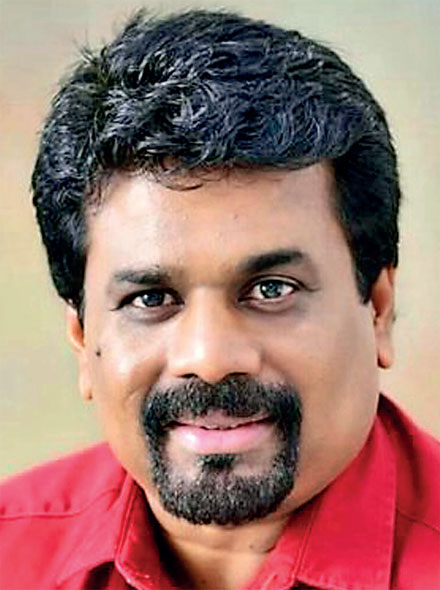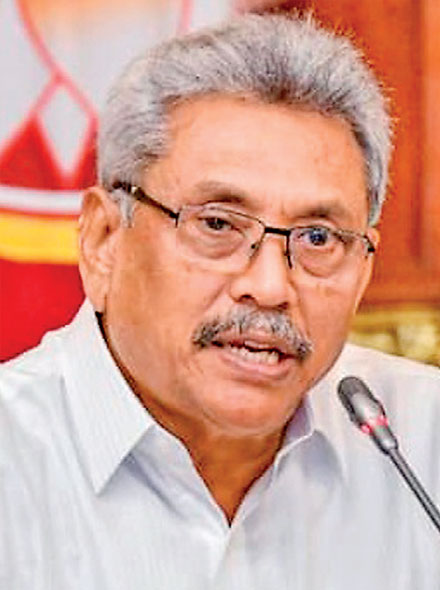Friday Feb 20, 2026
Friday Feb 20, 2026
Thursday, 20 January 2022 00:00 - - {{hitsCtrl.values.hits}}

JVP Leader Anura Kumara Dissanayake

President Gotabaya Rajapaksa
 This is the topic of the first chapter of the policy statement called ‘Rapid Response of Jathika Jana Balawegaya (NPP)’ launched recently.
This is the topic of the first chapter of the policy statement called ‘Rapid Response of Jathika Jana Balawegaya (NPP)’ launched recently.
Economies are dependent and are based on giving and taking. One cannot take without giving. Let alone the economies, the entirety of human society is based on this. If the NPP is thinking of an independent economy, it seeks isolation, which is not possible.
It goes on to state: “Introduced in 1977, the Open Economic Policy has been destructive through its prioritisation of personal gain over social responsibility. A clear indicator of the culture of greed this economic system has bred is how a select group of people benefits and profit from fraudulent and corrupt business practices even in the face of the pandemic. This culture of greed, and the destructive economic thinking that shapes it, has also created a system of political power centred in the hands of a few.”
Not only the open economic policies, but all other economic policies which are associated with socialist systems, are based on greed. One is based on the greed for money and the other is based on the greed for power. Greed is a personal trait which should be controlled by society for the benefit of all. It could be done effectively in an open society, economically as well as politically, in comparison to societies which are closed economically as well as politically.
The policy statement identifies that the anti-democratic open economic policy laid the foundation for the current severe economic crisis. “Instead of prioritising and strengthening production, the key features of this policy are the unnecessary expansion of financialisation, austerity measures, subsidy cuts, creating market monopolies, inefficient and excessive borrowing, and sale of public property and State-owned enterprises to a small coterie of favoured individuals and companies.”
This statement is contradictory. It appears to be that the NPP is against creating market monopolies and sale of State-owned enterprises. If a recent example is considered, there are only two companies in the Sri Lankan cooking gas market. State-owned Litro Gas owns around 80% of the market and it is a virtual monopoly. The Government has not taken any action against Litro Gas for repeated property damage and loss of lives due to sub-standard gas cylinders in the market. At the same time, the Colombo Crimes Division arrested the Managing
Director of Sakurai Aviation for criminal negligence due to a forced landing of an aircraft causing injuries to two passengers and two pilots. Isn’t Litro Gas liable for criminal negligence?
The people of this country and the NPP think that State-owned enterprises are people friendly and provide better service to the people compared to private sector companies. The best example to prove that this assumption is wrong is Litro Gas. If Litro Gas were a privately owned company at least the Government should be able to take action against the company as in the case of Sakurai Aviation.
Successive governments have wanted to keep State-owned enterprises to provide employment to their henchmen and henchwomen. This is to pay reciprocal compensation for support in the elections. Also, by this method the political authorities can exercise more power to their personal satisfaction. Trade Unions are supportive to be under Government ownership simply because they can work leisurely in comparison to the work in the private sector. All this gamut is covered by the propaganda of false patriotism and the victims are the public. Litro Gas proves this tragic reality.
Open economic policies promote production and economic growth. The NPP has to look around and see the thriving and dependent economies which practice open economic policies. India opened its economy in the early 1990s, much later than us. Vietnam was transformed from a centrally planned economy to a market-oriented economy. Their exports have grown exponentially in the last two decades. Bangladesh is having a high growth rate and their intention is to become a high-income country by 2041.
Vietnam is having an export led economy of which FDI attraction has played a key role. In 2018, foreign owned companies accounted for 70% of Vietnam exports. Export of goods and services and imports to GDP of Vietnam in 2019 was 106% and 103% respectively. This shows that exports and imports are two sides of the same coin. This is a dependency which is giving and taking. The economic patriots of this country, including the NPP, think otherwise.
Bangladesh exports account for only 15% of the GDP and the country is mainly dependent on apparel exports to which they get a preferential tariff from the European Union under the GSP+ scheme. The Bangladesh government tries to diversify the exports. Their wage rates are low and the population is high.
Japan is having budget deficits and having the highest rate of debt to GDP. However, their trade balance is positive which means their export income is more than the expenditure of imports. Greece is the second highest country of debt to GDP ratio. Greece had high budget deficits and trade deficits.
Sri Lanka is also having the same issue; a long standing budget deficit and current account deficit which is calculated after adding foreign remittances as well to the trade balance. This resulted in increasing the Government debt. Unnecessary investments by governments using borrowed money aggravated the situation. However, the blame cannot be assigned to the open economy. In fact, the situation deteriorated due to high Government expenditure on State-owned enterprises and Government subsidy schemes, out of which haves as well as the have-nots were benefited. The NPP is in favour of promoting the SoEs and giving subsidies to all. Therefore, the failure of the system was partly due to the practice of the so-called socialist policies recommended by the NPP and not the implementation of the open economic policies.
If Sri Lanka can have a favourable trade balance, it may be a rapid response to the present economic crisis in comparison to the policy statement of the NPP. This is the situation in Japan as well. But the dilemma is how to promote exports.
Sri Lanka at present cannot attract FDI as Vietnam did. The average income of Sri Lankans is also high compared to a country like Bangladesh. The population of the country is getting older. Therefore, Sri Lanka should believe in entrepreneurs. There are entrepreneurs of the country, and they are handicapped due to an unavailability of funds. Therefore, a SME Development Fund which provides necessary seed capital to entrepreneurs is needed. In addition to that, there should be a Credit Guarantee Fund which provides necessary guarantees to the commercial banks in support of the entrepreneurs who do not have necessary collateral to be given to banks.
A considerable percentage of the shares of the Export Development Board should be offered to the private sector and the board should be allowed to take a commission from the exporters to whom the board has connected the prospective buyers. This is powered by greed.
The ownership of the two large State banks, Bank of Ceylon and People’s Bank, should be shared with the private sector which would facilitate the reduction of the inefficiencies of those banks. Private banks maximise their profits under the cover of these giants. There are eight banks among the top 25 companies of Sri Lanka. This list does not include the unlisted privately owned companies, mainly the apparel exporters. Cash flow based lending to needy entrepreneurs should be promoted among the banks.
The NPP did not touch the cooperative sector of Sri Lanka. If properly directed this sector could be effectively used to promote exports. Although the statement promotes socialist ideology, it is silent about the growing inequality of the income distribution of the country.
Prabhakaran in the third round of peace talks with the Government held in Oslo in December 2002 agreed to explore a political solution founded on internal self-determination based on a federal structure within a united Sri Lanka. Later, he abandoned this idea to appease the cadres of LTTE and fought to the death.
If JVP, the base party of NPP, continues with their socialist ideology it would face the same fate Prabhakaran and the LTTE faced. It is advisable to change now. This suggestion is made since their personal traits are suitable to get the leadership of the country.